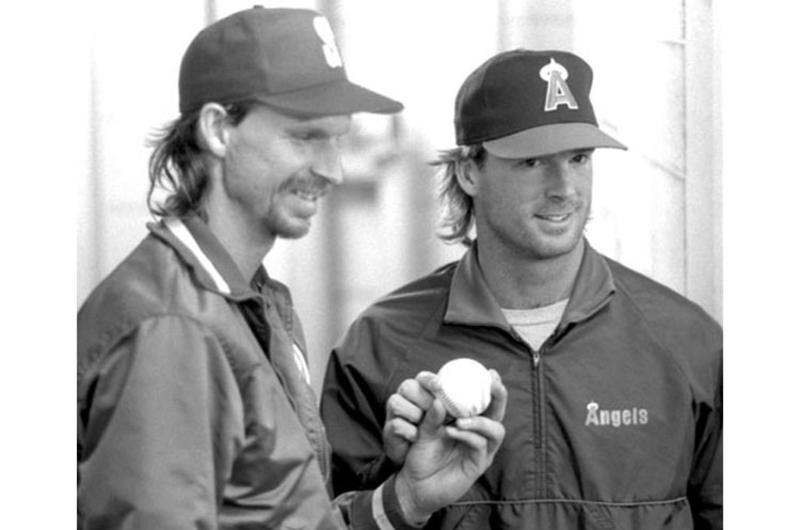

This website was created and maintained from May 2020 to May 2021 to commemorate the 75th anniversary of Stars and Stripes operations in the Pacific.
It will no longer be updated, but we encourage you to explore the site and view content we felt best illustrated Stars and Stripes' continued support of the Pacific theater since 1945.
Major leaguers close out with no-hitter

Randy Johnson and Chuck Finley pose for photos after the no-hitter against the Japan All-Stars.
By Harry F. Thompson | Stars and Stripes November 13, 1990
TOKYO — The no-hit parade marched out of the 1990 season in grand fashion.
Chuck Finley and Randy Johnson teamed-up to no-hit the Japan All-Stars to lift the major leaguers to a 5-0 win before 56,000 at Tokyo Dome Sunday in the final game of the eight-game exhibition series.
The series ended with Japan winning four games, the United States three and one tie.
Finley, a California Angels left-hander, walked three, struck out four in five innings before giving way to Seattle Mariner southpaw Randy Johnson. Johnson struck out four and walked two.
"I threw mostly slow stuff and Randy came in with the hard stuff," Finley said.
The first of a major-league record nine no-hitters began on April 11 when Finley's California Angel teammates, Mark Langston and Mike Witt, combined to no-hit the Mariners 1-0. Johnson followed with Seattle's first no-hitter, a 2-0 win over the Detroit Tigers on June 2.
"I started getting pumped up in the last inning and threw a lot of strikes. It felt just like the one I threw in Seattle against Detroit," Johnson said. "The crowd was into it today. As the game progressed and I got closer to the ninth inning I started getting more into the game, too."
Greg Olson blasted a three-run home run in the second to stake the Americans to an early lead. Ken Griffey Sr. of the Seattle Mariners and Toronto Blue Jay Kelly Gruber led off the inning with consecutive singles before Olson drilled a waist-high fastball deep into the left-field bleachers.
The Atlanta Braves catcher's first hit in the series came off rookie pitching sensation Hideo Nomo of the Kintetsu Buffaloes. Nomo, 18-8 this season, had the league's best ERA, 2.91, and struck out 287.
"I played in six of the eight games, mostly as a late inning defensive replacement," Olson said.
"It was great to make my only hit such a big one."
The major leaguers added two more runs in the third when Barry Bonds of the Pittsburgh Pirates drew a two-out walk and scored on Griffey Sr.'s opposite field double to right that Yakult Swallows outfielder Katsumi Hirosawa dropped after colliding with the wall. Gruber lined a double over the head of center fielder Koji Akiyama to score Griffey.
The Japanese mounted their only threat in the fourth inning when Yakult Swallows Takahiro Ikeyama and Kazuhiro Kiyohara of the Seibu Lions reached on consecutive errors by Chicago White Sox shortstop Ozzie Guillen and Gruber. Finley then bore down to retire the next three batters.
As the game the wore on, the fans and players became more excited about the prospects of seeing a no-hitter with the setting down of each Japanese batter.
"I NEVER CAUGHT a no-hitter so once it got past the seventh I started going `Come on,' " Olson said.
"Every time Randy threw a strike in the last inning you could see him grip his glove a little harder.' It was the same for me. I didn't want to make any mistakes in the last inning so I said let's go with his best pitch, so we went fastball the whole last inning. We didn't even mess around with anything else."
Like most of the touring pros, neither Finley nor Johnson looked impressive in their previous outings in Japan. Together they had a combined earned run average of 9.00.
"Maybe I had a little more adrenalin today because there was a no-hitter on the line," Johnson said. "Maybe it was because the reputation of American baseball was on the line."
After issuing a pair of walks in the second inning, Finley became stronger as the game progressed. He kept the Japanese hitters off-balance by changing speeds and working the corners with his forkball. But he was sure his no-hitter wouldn't last.
"These guys chink the ball all over the place. I was sure one could fall in at any time," Finley said.
In keeping with Manager Don Zimmer's pre-game plan, Finley left after five innings.
"After throwing 240-plus innings you don't know how your arm's going to react after you shut it down for a month and then crank it back up," Finley said. "I could've gone one more inning but I wasn't going to push it."
Then Johnson took the mound and gave the Japanese a taste of major-league heat.
"I don't think these guys have seen many fastballs over 90 miles an hour," Johnson said.
When Seibu Lions catcher Tsutomu Itoh flied to New York Yankee Jesse Barfield in right to end the game, Olson embraced Johnson as the Americans raced out toward the mound.
Ken Griffey Jr. of the Mariners was named the series' Most Valuable Player. He had eight hits in 19 series at bats, including a two-run homer in the fifth game. He received $34,600-worth of goods, including a golf set and a pearl necklace.
It was the first time an American All-Star team lost an exhibition tour in Japan. The only other American team to lose a tour was the 1970 San Francisco Giants, who finished with a 3-6 record.
"We didn't want to get embarrassed," Olson said. "After losing the first four, you could see the tension on all of our faces. To end it in style like this, it definitely helps."
"It would've been nice if we had won the series, but leaving on a no-hitter is the best note we can leave on," Finley said.


